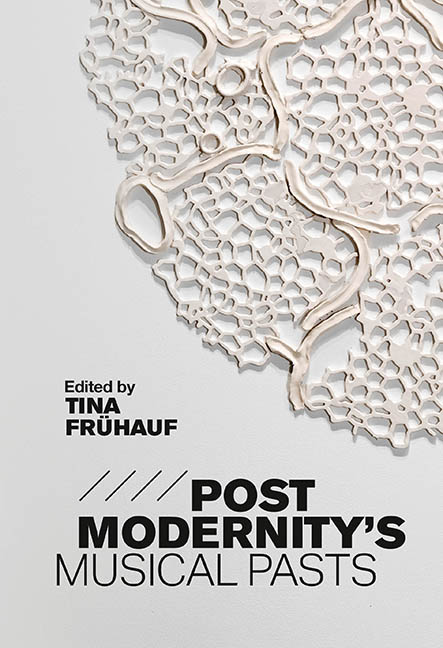Book contents
- Frontmatter
- Dedication
- Contents
- List of Illustrations
- List of Music Examples
- List of Contributors
- Acknowledgments
- About the Cover
- Introduction
- Part I Time and the (Post)Modern
- Part II Manifestations of History
- Part III Receptions of the Past
- Part IV Nostalgias and the Temporalities of Belonging
- Bibliography
- Index
8 - Time Re-Covered: Double Temporality in Ol ga Neuwirth's Hommage à Klaus Nomi
Published online by Cambridge University Press: 28 April 2020
- Frontmatter
- Dedication
- Contents
- List of Illustrations
- List of Music Examples
- List of Contributors
- Acknowledgments
- About the Cover
- Introduction
- Part I Time and the (Post)Modern
- Part II Manifestations of History
- Part III Receptions of the Past
- Part IV Nostalgias and the Temporalities of Belonging
- Bibliography
- Index
Summary
Research into cover versions has yielded a multitude of motivations (economic and artistic), methodologies, and processes associated with the musical practice, yet structural delineations of covering on musical grounds alone remain limited to broad characterizations in relation to levels of faithfulness to the original. As a corollary, distinctions between covering in popular music—be it a matter of interpretation, imitation, adaptation, quotation, sampling, or remixing—and in other genres throughout the ages (perhaps referred to as pastiche, arrangement, variation, fantasia, etc.) are vague. Although the term ‘cover version’ becomes awkward when applied to classical ‘works’ due to its association with popular ‘products’, some mutually underlying aspects can be derived from the experience of such hypertexts (if seen as distinct derivations of earlier music, i.e., hypotexts) in either realm; Sheldon Schiffer suggests a topology from the inside out: the issue of intrapersonal signification (i.e., changes in signification)—and, as a result, new meaning—perceptible to a listener familiar with the ‘elapsed’ original version poses new paradigms in relation to originality, authenticity, and historiography. As cover artists and composers, often crossing genres and generations, both interpret and rewrite a ‘decaying’ history in their present, they enter into a complex relationship with the listener’s—but also their own—memory and perception of the past, transmuting their (re-)creations into metahistory. As such, music can at once figure as both the subject and the object of the artist's telling of meta-history on either side of what Andreas Huyssen has termed the ‘great divide’ between ‘high’ and popular culture.
The objective of this essay is to show how covering music embodies unique processes of temporality and historicity while crossing that divide. As a means to that end, I rely on a case study of a work by the Austrian composer Olga Neuwirth (1968–), namely her Hommage à Klaus Nomi, initially arrangements of four songs from the second album by the synth-pop cover-artist Klaus Nomi, Simple Man (1982). Scored for countertenor and small ensemble (bass clarinet, trumpet, two synthesizers [also coupled to a sampler], percussion, amplified violoncello, and amplified double bass doubling electric bass), these were commissioned by the Salzburg Festival and premiered as part of its Next Generation series in 1998.
- Type
- Chapter
- Information
- Postmodernity's Musical Pasts , pp. 168 - 194Publisher: Boydell & BrewerPrint publication year: 2020



